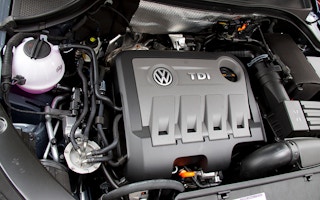Volkswagen has told the US Department of Justice that it will be paying nearly $15 billion in an effort to settle claims made by motorists in the US following the scandal over vehicle emissions.
The payout − a figure larger than some countries’ gross national product − follows revelations last year that VW had intentionally programmed hundreds of thousands of its diesel vehicles during environmental testing with software that considerably underestimated emissions of polluting gases.
The gases – nitric oxide and nitrogen dioxide, generally referred to as NOx – can react with other emissions to cause severe pollution and health problems, particularly in cities.
In a report issued late last year, the European Environment Agency estimated that more than 500,000 people in Europe are dying each year as a result of air pollution – much of it caused by emissions from vehicles, fossil fuel-burning power plants and industrial concerns.
Flagrant violation
Worldwide, the VW emissions scandal is believed to involve at least 11 million vehicles. One official in the US described VW’s actions as “the most flagrant violation of our consumer and environmental laws in our country’s history”.
Under the terms of the US settlement, VW will pay about $10 billion to buy back or repair vehicles wrongly tested. In addition, nearly $3 billion will be paid out to the US Environmental Protection Agency, and a further $2 billion will be given to support the development of zero-emission vehicles.
The German motor giant – the world’s second biggest car manufacturer, after Toyota of Japan – still faces several other legal challenges in the US and elsewhere in connection with the emissions scandal.
“
VW would become a model for a modern, transparent and successful company in terms of integrity and legal affairs.
Matthias Müller, CEO, Volkswagen
Norway’s sovereign wealth fund – the world’s largest – said recently that it would be suing VW. The fund is one of VW’s biggest shareholders.
There is no doubt that VW’s reputation – and its finances – have been severely damaged by recent events. But wider questions about the overall commitment of the corporate sector to dealing with air pollution and issues of climate change have also been raised.
Suspicion is widespread that many car manufacturers, in an effort to establish their environmental credentials, have been falsifying data on relative fuel efficiency of many of their products.
Earlier this year, Japanese conglomerate Mitsubishi admitted manipulating data on more than half a million cars made for the domestic market.
For its part, VW has been struggling to repair its image. Last month, the company announced plans to spend billions of dollars launching 30 new models over the next ten years driven entirely by electricity, with the aim of selling between two and three million electric vehicles a year by 2025.
Matthias Müller, VW’s CEO, told shareholders that the company was determined to do everything it could to win back trust. He said that VW would become “a model for a modern, transparent and successful company in terms of integrity and legal affairs”.
Impacts on health
In recent years, awareness has grown about the connection between air pollution and climate change, and their impacts on health.
Last month, a report by the International Energy Agency (IEA) said governments, rather than the private sector, must take the lead in tackling air pollution, which is annually killing more than six million people worldwide.
“It is a global problem and it is extremely important”, said Fatih Birol, the IEA’s executive director. “It is a crisis.”
The IEA says it is vital that governments take responsibility and adopt proper policies to tackle air pollution, including placing and enforcing regulations on industry.
If the right measures were put in place – such as investing in cleaner energies – there would be enormous benefits in terms of better health and social conditions, the IEA said.
This story is published with permission from Climate News Network.










